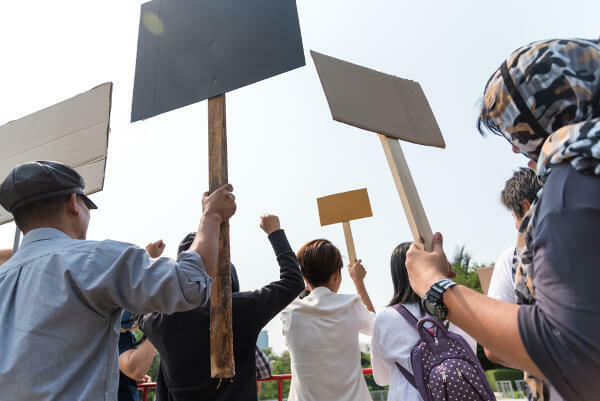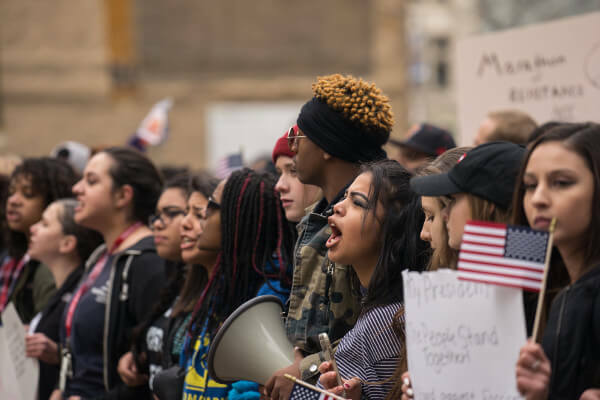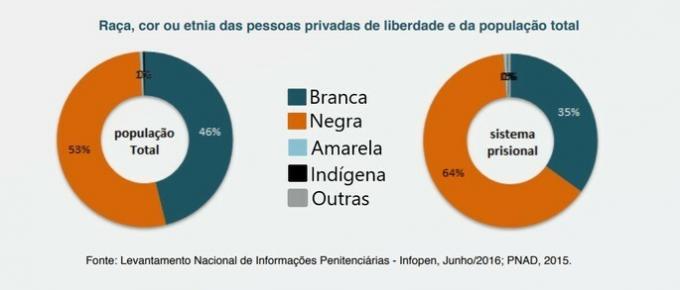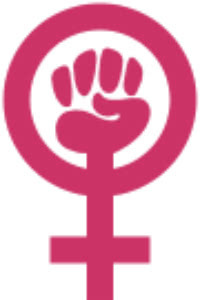The term democracy has Greek origin, and can be divided etymologically as follows: demos (people), Kratos (power). In general, democracy is the political practice of somehow dissolving power and political decisions among citizens.
Origin
Western democracy has origin in athens, at classical greece. The ancient Greeks created the idea of citizenship, which extended to those who are considered citizens and could, therefore, exercise their power to participate in city politics.
Greek democracy was restricted and this idea started to change from the French Revolution It's from Enlightenment modern, which, through republicanism, began to advocate for political participation of all social classes. Even in Modernity, despite political advances and an expansion of the concept of democracy, women did not have access to any kind of active democratic participation in republican countries, a fact that only began to be revised with the explosion of feminist movementof the suffragists, which culminated in the release, for the first time in history, of the female vote, in New Zealand, in 1893.
Although we know democracy closely, the concept that designates the word is broad and can be divided and represented in different ways. As there is not only one type of democratic political regime, democracy is basically divided into: direct, participatory and representative.
Do not stop now... There's more after the advertising ;)
Types of Democracy
Democracies can be classified into different types, based on the modehow they organize, and can also present many differentstagesindevelopment. Therefore, the term is broad and difficult to define, as the simple act of saying that "democracy is the power of the people" or of associating democracy with the practice of elections does not define the concept in its totality.
we can establish three types basics of democracy:
direct democracy
And the classic form of democracy exercised by the Athenians. There were no elections for representatives. There was a body of citizens that legislated. Citizens gathered at the ánow, a public place that housed the so-called legislative assemblies, where Athenian laws were created, debated and amended. Each citizen could directly participate by issuing their own legislative proposals and voting on other citizens' bills.
Athenian citizens were very fond of their politics and recognized themselves as privileged by being able to participate in that body so important to the city, that's why they took seriously the politics. The citizens prepared themselves, through the study of rhetoric, of Right and of the Politics, for the assemblies. Only male citizens were considered, in their majority, natives of Athens or children of Athenians and free. Decisions, then, were made by everyone, which was feasible due to the reduced number of citizens.
representative democracy
It is more common among the republican countries of the contemporary world. Due to the existence of vast territories and countless citizens, it is impossible to think of a direct democracy, as there was in Greece. Several factors contributed to the formation of this type of democracy, of which we can highlight:
Universal suffrage;
existence of a Constitution that regulates politics, public life and the rights and duties of all;
Equality of all before the law, which is established by the Constitution;
Need to elect representatives, as not everyone can participate;
Need for alternation of power to maintain democracy.
Read too:Human Rights: what they are, articles and how they came about
Representative democracies are governed by constitutions that establish a democratic rule of law. In these political organizations, every citizen is considered equal before the law, and every human being is considered a citizen. There can be no disrespect to the constitution, which is the largest bill of rights and duties in the country, and citizens elect representatives who will legislate and govern in their name, being representatives of popular power in the Executive and Legislative.
THE advantage of this type of political organization is the feasibility, and yours disadvantage is the opening for the corruptionand for political action in private good benefit and not the public good. As it is a system in which political participation is not exercised directly, but through representations, it is called indirect democracy.

The election of political representatives is the main feature of representative democracy.
participatory democracy
Neither a direct democracy, as was done in antiquity, nor a totally indirect one, as with representative democracy, participatory democracy mixes elements of one and the other. there are elections that choose and appoint members of the Executive and Legislative, but decisions are only taken through the participation and popular authorization.
This participation takes place in local assemblies, in which citizens participate, or through observation of popular leaders, in restricted assemblies, which may or may not have the right to vote. There are also plebiscites to hold a popular consultation before taking a political decision. This kind of democracy allows for a biggerparticipationcitizen, even with the expansion of the concept of citizenship and can be called semi-direct democracy.
Read too: What is a coup d'etat?
Examples of Democracy

The possibility of direct participation in politics is the main feature of participatory democracy.
Many countriesrepublicans Westerners have, to some degree, the development of some kind of democracy. There are also great monarchies, like England, which are democratic. Most democratic countries are representative democracy countries.
O systempoliticalBrazilian can be called representative, but our Federal Constitution of 1988 allows for a broad participationpopular that, if it were effectively applied, it could place us at the level of participatory democracy, including foreseeing the possibility of a popular legislative initiative.
Some states of the StatesUnited exercise the participatorysemi-direct, and a good example of a country that exercises participatory democracy is the Switzerland. Direct democracy, on the other hand, no longer exists at the national level in contemporary times due to its infeasibility in the face of the expansion of the concept of citizenship.
Read too:How are presidential elections conducted in the United States?
modern democracy

Protest against Donald Trump, current president of the United States, on his inauguration day. Modern democracy establishes equal treatment for everyone.
The whirlwind of ideals that emerged in Europe during Modernity gave rise to the enlightenment and to calls revolutionsbourgeois. The Enlightenment is a good example of the rescue of certain Western ideals, long forgotten, against the so-called Ancien Regime. It was about thinking of a expansion of the concept of sovereignty (now popular) and from citizenship. To do so, it was necessary to revive the Greeks' idea of democracy and bring a new form of to think about politics, without social stratification, as happened in the European aristocratic system until then.
the ideals of freedom, equality and fraternity, chanted as mantras during the French Revolution, are a strong symbol of modern democracy, which was born at the same time as republicanism. However, it is worth remembering that republic and democracy are not synonymous. Modern democracy provides for the creation of a rule of law, where everyone is, in principle, free and equal, regardless of origin, social class, color or religion.
Moreover, the Democratic State must be secular, so that it contemplates people of all existing religions. At more mature democracies they date from the same period in which European Enlightenment thought was growing, in the XVIII century, and we can mention the France and the U.Slike the oldest ones.
In these mature democracies, there is a recent problem related to little popular participation and the dissatisfaction with the creation of a state, sometimes neglectful and sometimes too bureaucratic, making life difficult for citizens, intensifying social inequalities or being held back by the corruption of the system.
There are also the recent and fragile democracies which, following modern examples, have not yet fully established themselves, and many citizens are still not used to democratic life. They are democracies that only emerged in the 20th century, after conservative right-wing dictatorships, communist dictatorships or long totalitarian regimes (as in the case of Portugal and Spain).
Read too: How oranges are used in corruption
Democracy and dictatorship

Protesters burning car during protest. Disagreement is a fundamental mark of democracy.
Systematically, democracy and dictatorship they are opposite terms. It is not the simple fact that there is a political choice in a country (election) that automatically makes it a democracy. Many dictatorships allow elections to make the political process look more legitimate. However, the absence of popular participation in politics and other factors can call what we call dictatorship.
To be effectively considered a democracy, a country must contain, among other things:
freedom of expression and press;
possibility of voting and political eligibility;
freedom of political association;
access to information;
reputable elections.
Failure to observe the above factors, added to other factors, such as the overturning of a legal constitution without the formation of a Constituent Assembly, may indicate the existence of a dictatorship.
When a Democratic State of Law, represented by the Constitution, is, for some reason, suspended, interrupted or left aside, we can say that there is the formation of a state of exception, which is one of the characteristics of a dictatorship.
The contemporary French philosopher Jacques ranciere wrote a book titled Hatred of Democracy, in which he talks about the democratic crisis that has devastated countries in the 21st century. According to the thinker, the world has acted against democracy by a kind of fear that it can put in the average citizen: the fear that democracy is the political regime par excellence.
Rancière claims that democracy is the dissent regime, and this has promoted the split of the population. It is normal for there to be disagreement within a democratic regime, but there must also be mutual respect for all parties that respect democracy, and there must be an attempt to build a common project based on disagreement.
From the moment authoritarian sectors do not respect their opponents, a hate process against democracy who asks for the end of it so that the adversary and his political position are eliminated. That's where the yearning for dictatorship comes from.
Read too: How many coups d'etat have there been in Brazil since independence?
Democracy in Brazil
Like so much else in Brazil, the relationship between democracy and politics here is complicated. At First Republic, or RepublicOld, we had a provisional period commanded by military sectors (1889 - 1894). A period in which the so-called “coffee-with-milk policy” began a long struggle between leaders of São Paulo and Minas Gerais for the presidency of the country.
In 1930, a slate led by Júlio Prestes, from São Paulo, was nominated and elected. However, Minas Gerais politicians do not accept the election, starting the 1930 revolution, which ends the republic and starts the It was Vargas. A feature of the First Republic was the halter vote, in which local colonels ordered and inspected people when they voted, creating a fraud that undermines the legitimacy of the democratic process.
Democracy was only re-established in Brazil in 1945, and, in 1964, the country experienced another blow against the Brazilian republic and against democracy. it is about the coupcivil-military which imposed a regime of exception between 1964 and 1965, suspending civil rights and the constitution, imposing censorship on the press and closing, for a few moments, the National Congress.
In 1985, the military dictatorship ends, but it leaves a mark on the electionsindirect for president. There is the prevalence of a great movement, started at the end of the dictatorship, which was called "Direct now!” and called for the establishment of direct elections for president. In 1988, the Constituent Assembly that creates the Federal Constitution of 1988 and it re-establishes the possibility of full democracy, reinforcing rights and promoting equality.
Respect for this democracy, even by representatives of the Legislative, Judiciary and Executive, and by the civilian population, it is still a problem, as we have seen the systemic violation of constitutional values by politicians elected by the people and by the people. Amid the ups and downs, the Brazilian democracy continues to oscillate.
by Francisco Porfirio
Sociology Professor



